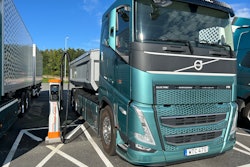Trucking news and briefs for Friday, Sept. 13, 2024:
FHWA seeking feedback on electric truck charging infrastructure needs
The Federal Highway Administration (FHWA) is requesting public input on a request for information (RFI) regarding the charging technologies and infrastructure needs of medium- and heavy-duty battery-electric trucks.
This RFI seeks input in four areas to support medium and heavy-duty (MHD) battery-electric trucks, including:
- Unique EV charger and station needs
- Vehicle charging patterns
- MHD EV charger technology and standardization
- Workforce, supply chain, and manufacturing to support charging of MHD EVs
The goal of the RFI is to inform appropriate future federal government activities to support the development and deployment of EV chargers to support the anticipated needs of MHD EV original equipment manufacturers, fleet operators, drivers, charging station operators, and electric utilities, FHWA said. The agency also asked that comments address how to balance advances in technology with the need to expeditiously build out the national EV charging infrastructure, including support for MHD segments.
[Related: Zero-emissions needs to be done “at the speed of right,” Daimler exec says]
FHWA highlighted the diverse nature of the trucking sector, including vehicles engaged in on-demand operations with structured schedules, such as urban delivery trucks and tractor-trailers that cover longer distances.
“Shorter haul vehicles can often use centralized charging depots with the opportunity for lower power charging,” the RFI noted. “At the other end of the spectrum, long-haul and over-the-road applications, exemplified by heavy-duty trucks engaged in interstate freight transportation, may require ultra-fast charging capabilities to allow trucks to quickly get back on the road.”
FHWA added that because long-haul trucks operate continuously for extended periods, it’s necessary to have “strategically located charging stations along major transportation corridors to facilitate rapid turnaround times” or to “provide parking facilities with charging.”
“Developing a charging infrastructure ecosystem entails addressing this spectrum of use cases comprehensively, ensuring that solutions are scalable, adaptable, and aligned with the evolving needs of the transportation industry,” FHWA said.
The agency acknowledged that “hydrogen refueling can provide a zero-emission fuel option for commercial MHD vehicles,” but said this particular RFI is only seeking information on electric charging considerations.
FHWA will accept comments here through Nov. 12, noting that the questions listed here are of particular interest. Commenters are not required to answer every question, and the listed questions are not intended to be a constraint on a commenter providing additional information relevant to MHD EV charging technologies and infrastructure needs.
[Related: Electrifying commercial vehicles will hit consumer pocketbooks]
Averitt opens new East Texas terminal
 Averitt has opened a new facility in Tyler, Texas.Averitt
Averitt has opened a new facility in Tyler, Texas.Averitt
Averitt (CCJ Top 250, No. 22) has announced the opening of its new service center in Tyler, Texas, strategically located near I-20.
The facility, covering 20,500 square feet with 33 dock doors, significantly increases Averitt’s capacity, enabling faster and more efficient freight handling for customers in one of Texas' fastest-growing markets, the company said.
The new center is designed to streamline operations with expanded dock space, two on-site fuel islands, and secure parking. These upgrades enable Averitt to provide more reliable, timely service to customers, while also enhancing the work environment for associates through modern amenities such as break areas and new restrooms and showers.
“Our new Tyler facility is a major step forward in our ability to serve customers across East Texas and beyond,” said Bryan Walters, Tyler service center director. “With improved infrastructure and increased capacity, we’re positioned to meet the growing needs of our customers, delivering the high-quality service they expect from Averitt.”
This facility also marks the debut of Averitt’s newly redesigned signage, featuring a streamlined Averitt logo and updated color scheme that matches Averitt’s fleet of equipment, associates' uniforms, and reflects the modern evolution of its brand.
Tennessee transpo official charged for stealing diesel for personal trucking company
 Clay County (Tennessee) Highway Superintendent Jason Browning admitted to using department-purchased fuel in his Peterbilt 379 used as part of his own trucking business.Tennessee Comptroller's Office
Clay County (Tennessee) Highway Superintendent Jason Browning admitted to using department-purchased fuel in his Peterbilt 379 used as part of his own trucking business.Tennessee Comptroller's Office
An investigation by the Tennessee Comptroller’s Office has resulted in the indictment of Jason Browning, the elected Clay County (Tennessee) Highway Superintendent.
Investigators determined that Browning misappropriated at least $56,971.60 in 16,200 gallons of department-purchased diesel fuel for his personal transportation business.
Browning admitted that he used an estimated 150 gallons of department fuel each week from July 2021 through July 2023, to fuel his personal 2007 Peterbilt 379. He used the truck as part of his private trucking business, Browning Trucking, the comptroller said. He sold the truck in July 2023.
Browning’s misappropriation resulted in the department operating on and having less fuel on reserve than believed by department employees, the comptroller’s office noted, adding that his actions put the department at risk of having insufficient fuel supplies in case of a natural disaster or large project.
Based upon the investigation, Browning was indicted by the Clay County Grand Jury on one count of theft over $10,000 and three counts of official misconduct.
“The Clay County Highway Department should maintain inventory records documenting the receipt, usage and storage of fuel,” said Comptroller Jason Mumpower. “By reconciling the amount of fuel that is purchased to the amount that is used, the department can better detect any improper usage.”











